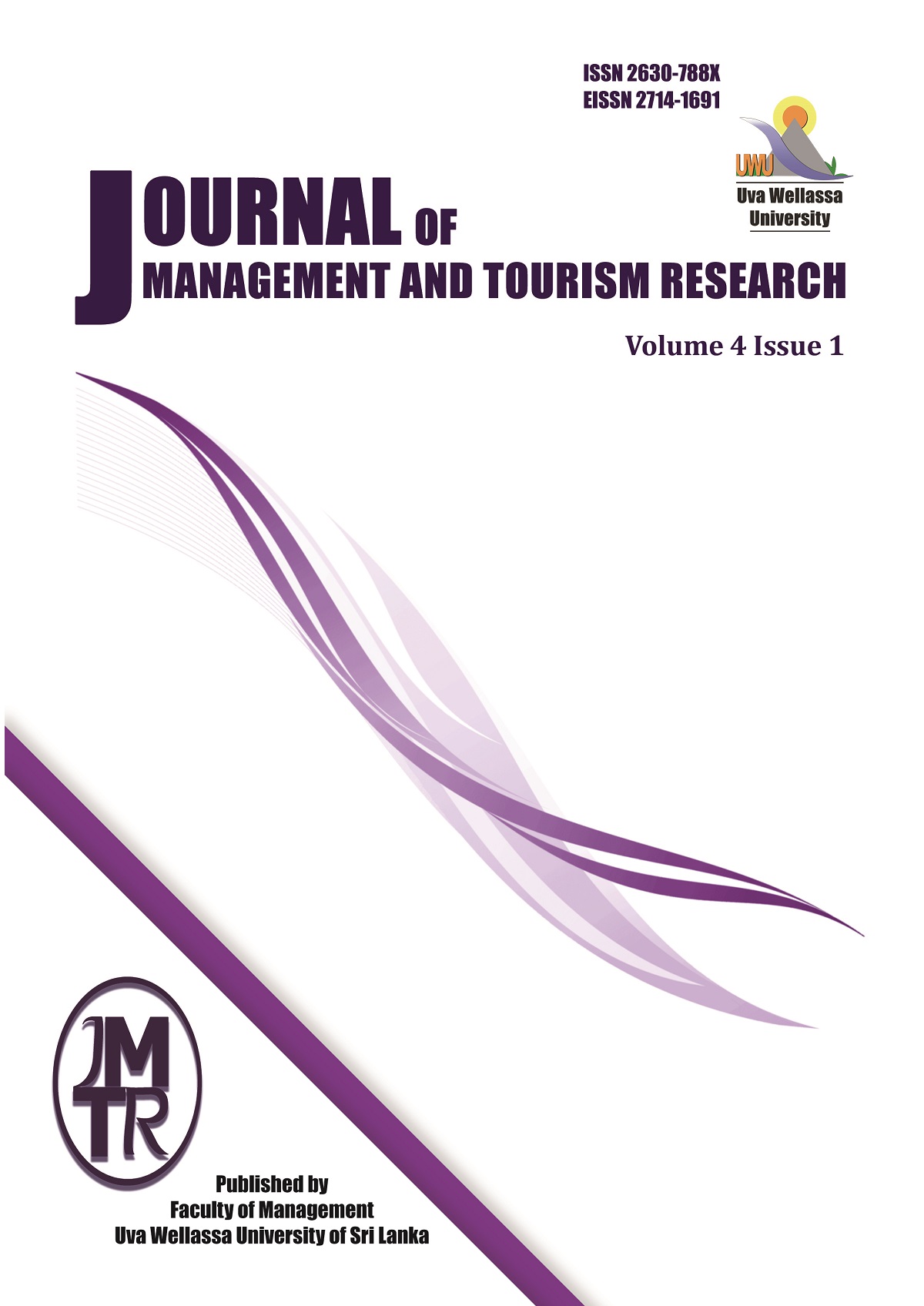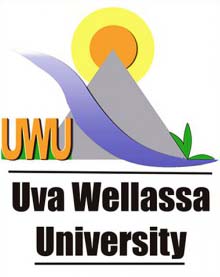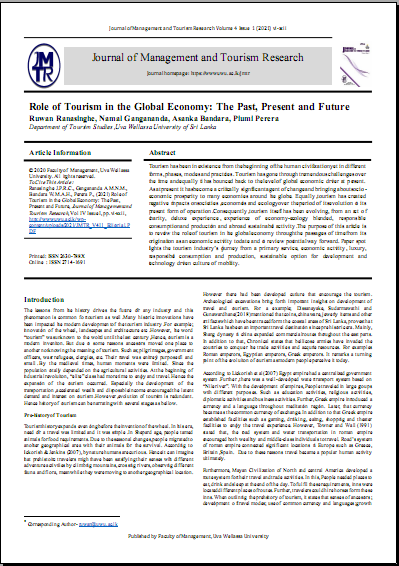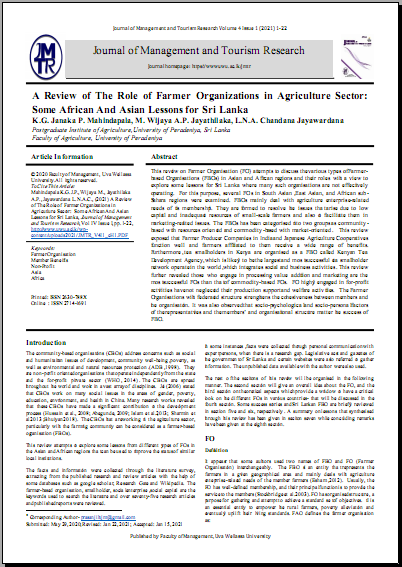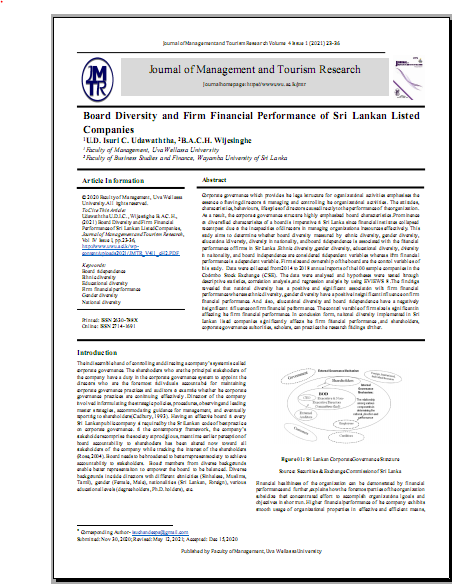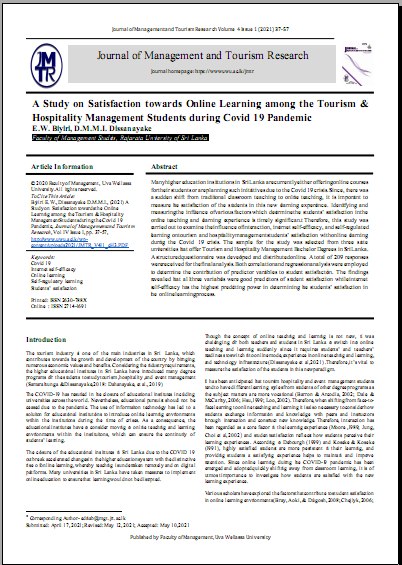Volume 04, Issue 01
TABLE OF CONTENTS
Editorial : Role of Tourism in the Global Economy: The Past, Present and Future
Ruwan Ranasinghe, NamalGangananda, Asanka Bandara, PiumiPerera
Department of Tourism Studies, UvaWellassa University of Sri Lanka
INFORMATION
Journal Title: Journal of Management and Tourism Research
Volume : 4 Issue : 01
Page : vi-xxi
Correspondence : ruwan@uwu.ac.lk
ABSTRACT
Tourism has been in existence from the beginning of the human civilization yet in different forms, phases, modes and practices. Tourism has gone through tremendous challenges over the time and equally it has bounced back to the level of global economic driver at present. As at present it has become a critically significant agent of change and bringing about socio-economic prosperity to many economies around the globe. Equally, tourism has created negative impacts on societies, economies and ecology over the period of its evolution to its present form of operation. Consequently, tourism itself has been evolving, from an act of charity, deluxe experience, experience of economy-ecology blended, responsible consumption and production and a broad sustainable activity. The purpose of this article is to review the role of tourism in the global economy through the passages of time from its origination as an economic activity to date and to review potential way forward. Paper spot lights the tourism industry’s journey from a primary service, economic activity, luxury, responsible consumption and production, sustainable option for development and technology driven culture of mobility.
01. A Review of The Role of Farmer Organizations in Agriculture Sector: Some African And Asian Lessons for Sri Lanka
K.G. Janaka P. Mahindapala, M. Wijaya A.P. Jayathilaka, L.N.A. Chandana Jayawardana
Postgraduate Institute of Agriculture, University of Peradeniya, Sri Lanka
Faculty of Agriculture, University of Peradeniya
INFORMATION
Journal Title: Journal of Management and Tourism Research
Volume : 4 Issue : 01
Page : 1 – 20
Submitted: May 29, 2020; Revised: Jan 22, 2021; Accepted: Jan 15, 2021
Correspondence : prasanjithjm@gmail.com
ABSTRACT
This review on Farmer Organisation (FO) attempts to discuss the various types of Farmer-based Organisations (FBOs) in Asian and African regions and their roles with a view to explore some lessons for Sri Lanka where many such organisations are not effectively operating. For this purpose, several FOs in South Asian, East Asian, and African sub-Sahara regions were examined. FBOs mainly deal with agriculture enterprise-related needs of its membership. They are formed to resolve the issues that arise due to low capital and inadequate resources of small-scale farmers and also to facilitate them in marketing-related issues. The FBOs has been categorised into two groups as community-based with resources oriented and commodity-based with market-oriented. This review exposed that Farmer Producer Companies in India and Japanese Agriculture Cooperatives function well and farmers affiliated to them receive a wide range of benefits. Furthermore, tea smallholders in Kenya are organised as a FBO called Kenyan Tea Development Agency, which is likely to be the largest and most successful tea smallholder network operate in the world, which integrates social and business activities. This review further revealed those who engage in processing value addition and marketing are the most successful FOs than that of commodity-based FOs. FO highly engaged in for-profit activities have not neglected their production support and welfare activities. The Farmer Organisations with federated structure strengthens the cohesiveness between members and the organisation. It was also observed that socio-psychological and socio-personal factors of the representatives and the members’ and organisational structure matter the success of FBO.
Keywords: Farmer Organisation, Member Benefits, Non-Profit, Asia, Africa.
02. Board Diversity and Firm Financial Performance of Sri Lankan Listed Companies
1U.D. Isuri C. Udawaththa, 2B.A.C.H. Wijesinghe
1Faculty of Management, Uva Wellassa University
2Faculty of Business Studies and Finance, Wayamba University of Sri Lanka
INFORMATION
Journal Title: Journal of Management and Tourism Research
Volume : 4 Issue : 01
Page : 21 – 31
Submitted: Nov 30, 2020; Revised: May 12, 2021; Accepted: Dec 15, 2020
Correspondence : isuchandeepa@gmail.com
ABSTRACT
Corporate governance which provides the legal structure for organizational activities emphasises the essence of having directors in managing and controlling the organizational activities. The attitudes, characteristics, behaviours, lifestyles of directors cause directly to the performance of the organization. As a result, the corporate governance structure highly emphasized board characteristics. Prominence on diversified characteristics of a board is imperative in Sri Lanka since financial institutes collapsed recent past due to the incapacities of directors in managing organizational resources effectively. This study aims to determine whether board diversity measured by ethnic diversity, gender diversity, educational diversity, diversity in nationality, and board independence is associated with the financial performance of firms in Sri Lanka. Ethnic diversity, gender diversity, educational diversity, diversity in nationality, and board independence are considered independent variables whereas firm financial performance is a dependent variable. Firm size and ownership of the board are the control variables of this study. Data were collected from 2014 to 2018 annual reports of the 100 sample companies in the Colombo Stock Exchange (CSE). The data were analysed and hypotheses were tested through descriptive statistics, correlation analysis, and regression analysis by using EVIEWS 8. The findings revealed that national diversity has a positive and significant association with firm financial performance whereas ethnic diversity, gender diversity have a positive insignificant influence on firm financial performance. And also, educational diversity and board independence have a negatively insignificant influence on firm financial performance. The control variable of firm size is significant in affecting the firm financial performance. In conclusion form, national diversity implemented in Sri Lankan listed companies significantly affects the firm financial performance, and shareholders, corporate governance authorities, scholars, can practice the research findings further.
Keywords:Board independence, Ethnic diversity, Educational diversity, Firm financial performance, Gender diversity, National diversity
03. A Study on Satisfaction towards Online Learning among the Tourism & Hospitality Management Students during Covid 19 Pandemic
E.W. Biyiri, D.M.M.I. Dissanayake
Faculty of Management Studies, Rajarata University of Sri Lanka
INFORMATION
Journal Title: Journal of Management and Tourism Research
Volume : 4 Issue : 1
Page : 32-47
Submitted: April 17, 2021; Revised: May 12, 2021; Accepted: May 10, 2021
Correspondence : edinab@mgt.rjt.ac.lk
ABSTRACT
Many higher education institutions in Sri Lanka are currently either offering online courses for their students or are planning such initiatives due to the Covid 19 crisis. Since, there was a sudden shift from traditional classroom teaching to online teaching, it is important to measure the satisfaction of the students in this new learning experience. Identifying and measuring the influence of various factors which determine the students’ satisfaction in the online teaching and learning experience is timely significant. Therefore, this study was carried out to examine the influence of interaction, internet self-efficacy, and self-regulated learning on tourism and hospitality management students’ satisfaction with online learning during the Covid 19 crisis. The sample for the study was selected from three state universities that offer Tourism and Hospitality Management Bachelor Degrees in Sri Lanka. A structured questionnaire was developed and distributed online. A total of 209 responses were received for the final analysis. Both correlation and regression analysis were employed to determine the contribution of predictor variables to student satisfaction. The findings revealed that all three variables were good predictors of student satisfaction while internet self-efficacy has the highest predicting power in determining the students’ satisfaction in the online learning process
Keywords:Covid 19, Internet self-efficacy, Online learning, Self-regulatory learning, Students’ satisfaction
04. Effects of Working Capital Approaches and Firm’s Returns of Sri Lankan Listed Non-Financial Companies
G.R.M. Gamlath
Department of Finance and Accountancy, Vavuniya Campus of the University of Jaffna
INFORMATION
Journal Title: Journal of Management and Tourism Research
Volume : 4 Issue : 1
Page : 48-69
Submitted: March 2, 2021; Revised: June 12, 2021; Accepted: June 8, 2021
Correspondence : methikalak@gmail.com
ABSTRACT
The aim of this study is to find out the effects of aggressive/conservative working capital management policies; (both investment and financing policies) have on firms’ returns for 172 Sri Lankan listed non-financial companies of 17 business sectors listed at Colombo Stock Exchange (CSE) for a period of six years from 2014 to 2019. Data were obtained from the annual audited financial statement of the firms presented to CSE. The study adopted Descriptive Statistics Least Significant Differences (LSD), Rank Correlation, and Linear Regression models in analyzing the data. The results revealed that the working capital investment and financing policies have generally significant positive effects on firms’ returns to the investors as well as financial managers in the long run. The empirical evidence suggests that the balanced and well-monitored policy including both conservative working capital investment and financing policies should be an ideal as regularized and reviewed in the process. The study emphasized that the conservative working capital investment policies increase firms returns while conservative financing policies yield negative returns. Therefore, this study would enable finance managers to be able to regularize and prepare the appropriate working capital management policies. Moreover, findings suggest the Sri Lankan business firms pursuing the conservative working capital investment policy should balance it with an aggressive working capital financing policy to enhance firms’ returns and to create value for their investors.
Keywords:
Aggressive Working Capital Management, Conservative Working Capital Management, Working Capital Approaches, Firms’ Returns, Sri Lankan Listed Companies
05. A Theoretical Framework for National HRD Research: A Critical Review on Going Beyond Traditional HRD
Udaya Mohan Devadas
Faculty of Commerce and Management Studies, University of Kelaniya Sri Lanka
INFORMATION
Journal Title: Journal of Management and Tourism Research
Volume : 4 Issue : 1
Page : 70-86
Submitted: March 15, 2021; Revised: June 15, 2021; Accepted: June 14, 2021
Correspondence : mohanudaya395@gmail.com
ABSTRACT
Human Resource Development (HRD) has been evolving since 1970s. Due on the major criticism, raised against Traditional HRD (THRD), National HRD is emerging by bridging the gaps, unnoticed by the THRD. Yet, the literature to explain NHRD within countries are still at a premature level. Further, the theoretical frameworks and models that guide deciding NHRD research is not available. Thus, this study is designed as a focused literature review with the purpose of developing a theoretical framework to guide NHRD country case study research. As research findings, the author identified that: traditional HRD domain is incapable of resolving contemporary challenges due on its salient weaknesses and limitations; the contemporary HRD challenges are mainly stimulated from higher levels other than organisational level, and demand ‘helicopter view’ in the analysis; National HRD as a macro and modern HRD agenda merits to address the contemporary HRD challenges; and NHRD’s existing knowledge provides five main NHRD practical models and NHRD’s problems and challenges. As the final outcome of this study, a theoretical framework was developed to guide future NHRD research. This study was limited to identify the selected literature that answers the identified research questions, hence, all literature in HRD and NHRD have not been reviewed. The study implicates in introducing NHRD framework to countries like Sri Lanka to undertake NHRD research. Thus, the author recommends that traditional HRD should be pressurised for adoption of attributes of modern HRD while promoting NHRD research and practice to prepare people to contribute to national development.
Keywords:Human Resource Development (HRD), National Human Resource Development (NHRD), HRD Challenges, NHRD Challenges, NHRD Theory Development
